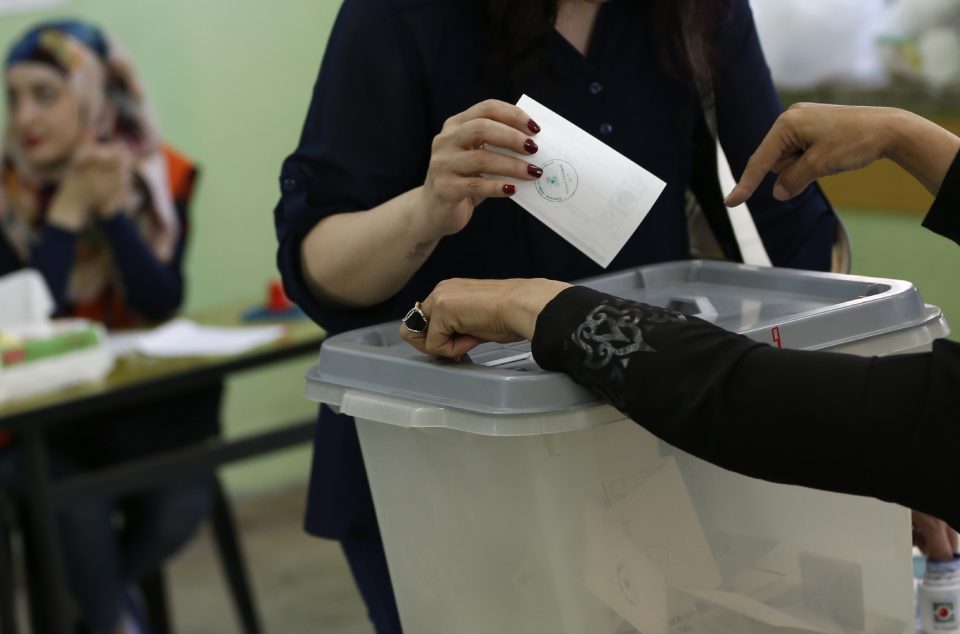
by Sarah Benhaida
Agence France-Presse
RAMALLAH, Palestinian Territories – Palestinians in the occupied West Bank voted Saturday in municipal elections that underscored deep rifts between president Mahmud Abbas’s Fatah party and Islamist rival Hamas which runs the Gaza Strip.
Their failure to reconcile is seen as a major obstacle to any settlement of the Israeli-Palestinian conflict.
The West Bank and Gaza have not participated in an election together since 2006, when Hamas swept Palestinian parliamentary polls, sparking a conflict that led to near civil war in Gaza the following year.
Escalating tensions between Hamas and the more moderate Fatah led to Hamas’s seizure of Gaza in 2007, while Abbas’s party was left with control of the West Bank.
Voting for around 300 municipal councils opened at 7:00 am (0400 GMT) at dozens of schools across the West Bank, which has been occupied by Israel for half a century.
Hanna Nasser, chairman of the Palestinian election commission, said many of the contenders were from Fatah, while in some villages “clans and families” had decided on the candidate lists.
Hamas did not present any candidate lists of its own, saying the vote would only add to divisions.
‘Better than nothing’
Polling stations closed at 7:00 pm and final results are expected on Sunday.
Electoral commission chief Hanna Nassir said 393,572 ballots were cast — “nearly 50 percent of voters”.
He said turnout was “almost exactly the same as in 2012”.
Fatah and unaffiliated candidates close to Abbas were expected to win the most seats, as they did in 2012 when Hamas boycotted the vote.
“It’s important that everyone has a say” but also that those elected “assume the responsibility given to them”, said Rami Nazal, a UN employee who voted in Ramallah, the seat of the Palestinian Authority.
Mechanic Samir Beshari said his choice “wasn’t just political”, as above all he believed “the winners should look after the city and all its inhabitants”.
More than a million Palestinians were registered to choose from among 4,400 candidates in a vote that was seen as yet another sign that reconciliation may be a long way off.
Even so, “municipal elections are better than nothing” in a country where “the situation is unlike anywhere else in the world”, said Zina Masri, who voted before going to work.
Software shop manager Amjad Mustafa said the election was “an event not to be missed” after “a long time since we last took part in a democratic event”.
The Palestinian high court ruled in October that the municipal elections should be held only in the West Bank because the judiciary in Gaza did not have the necessary “guarantees” in place — a decision Hamas denounced as “political”.
Subsequent efforts to hold the polls in both territories simultaneously were unsuccessful as the two parties failed to bridge their differences.
Palestinian prime minister Rami Hamdallah accused Hamas on Saturday of sole responsibility for blocking the election in Gaza where he said it maintains a rival government that supports “separation”.
Abbas, whose term was meant to end in 2009 but who has remained in office, has grown unpopular among Palestinians, but he remains their leader in the eyes of the world.
He met US President Donald Trump in Washington on May 4, and is expected to do so again when Trump travels to the Middle East later this month.
Hamas, meanwhile, is considered a terrorist group by Israel and by much of the West, despite recent attempts by the movement to soften its image.
After the 2006 election, the international community refused to deal with any government in which Hamas participated until it renounced violence and recognised Israel and past peace agreements.







